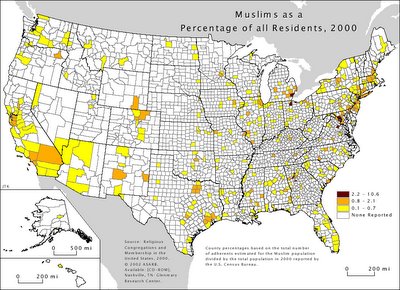I don't think that any Muslims have authority to tell another Muslim that he's not a Muslim if he believes he is. I think each person has a right to determine his own religion.
My original response to this was the following:
Muslims can and do have the authority to tell another person that he or she is not a Muslim. Granted, this power should be used rarely, if at all. However, self-identification as a Muslim is not accepted within the Muslim community, and in some countries, such as Singapore, Muslim converts are tested as to their knowledge and practices of Islam before they are officially registered as a Muslim.
There are several reasons why self-identification is not allowed in Islam. One reason is because there are some groups, such as the Ahmadiyya, who are deviant offshoots of Islam who wish to be recognized as part of the greater Muslim community. The Ahmadiyya fail in this test because they have some beliefs regarding their founder that go against Muslim beliefs (specifically, against the Qur'an). Despite their wish to self-identify as Muslims, orthodox Muslims do not recognize the Ahmadiyya as part of the Islamic community.
A second reason is because some people wish to infiltrate the Muslim community by pretending to be Muslims. A recent case of this happened last year, when Chris Gaubatz [also see here] pretended to be a Muslim in order to obtain an internship at CAIR, where he stole thousands of pages of documents. (The most "damning" thing the documents spoke of was CAIR's goal of trying to get as many Muslims placed as Congressional interns as possible. The right tried to make hay of the story, but were ridiculed by virtually every group that has some sort of political interest, where they all agreed that they too had the same goal.)
Because of these and other concerns, Muslims don't accept self-identification. A person may self-identify as a Muslim, and they may truly be Muslim (only Allah (swt) actually knows what is in his or her heart), but that doesn't mean that we, the Muslim community, have to take their word for it. As with many other religious claims, we would tell that person, "Prove it!"
To which that person responded:
I don't care if self-identification isn't used among Muslims. Most Jews don't accept it. Some Christians don't accept it, but I see no other policy which is reasonable. As long as you don't accept group responsibility, which I don't, then self-identification is the the right approach to take. If someone claims they are an X, then they are that religion.
And I replied:
You may not care but that's not how it's going to be among Muslims. One person's opinion is not going to trump a consensus opinion among both Muslim scholars and non-scholars based upon 1400 years of experience. We have our reasons, as I mentioned above, and I believe them to be good reasons.
To be sure, as I also mentioned above, the naming of a person or group as a takfir (an apostate) is an act that is fraught with peril for the person who does so, as I wrote about on one of my blogs (Why Muslims Don't Pronounce "Takfir"). However, the minimum requirement to be accepted as a Muslim among Muslims is a public declaration of the shahadah in front of two Muslims. But even there, it is still possible for someone who does not have the proper intentions to deceive. Hence, our rejection of self-identification.
To which that person replied:
OK, I still don't care. If someone raised a Muslim decides he's an Atheist or a Christian or whatever, that's what he is. I think all of these regulations on who gets to count as a Jew, Muslim, Christian, etc... are offensive and illiberal.
My final comments are:
If someone raised a Muslim decides he's an Atheist or a Christian or whatever, that's what he is.
Which is fine by me. I'm not arguing this point.
I think all of these regulations on who gets to count as a Jew, Muslim, Christian, etc... are offensive and illiberal.
That's your opinion, and you're welcome to it. There's nothing to stop a person from self-identifying or becoming a Muslim, but that doesn't mean that the Muslim community must recognize that person as a Muslim. If that's "offensive and illiberal" so be it. The Muslim community expects certain standards to be met in terms of both beliefs and practices. Muslims themselves may fall into and out of a state of Islam throughout their lives (although we do, of course, hope to die in a state of Islam when that time comes, insha'allah). It's not terribly difficult to be recognized by other Muslims as a Muslim, but we do follow our rules, not the rules other people think we should follow.


